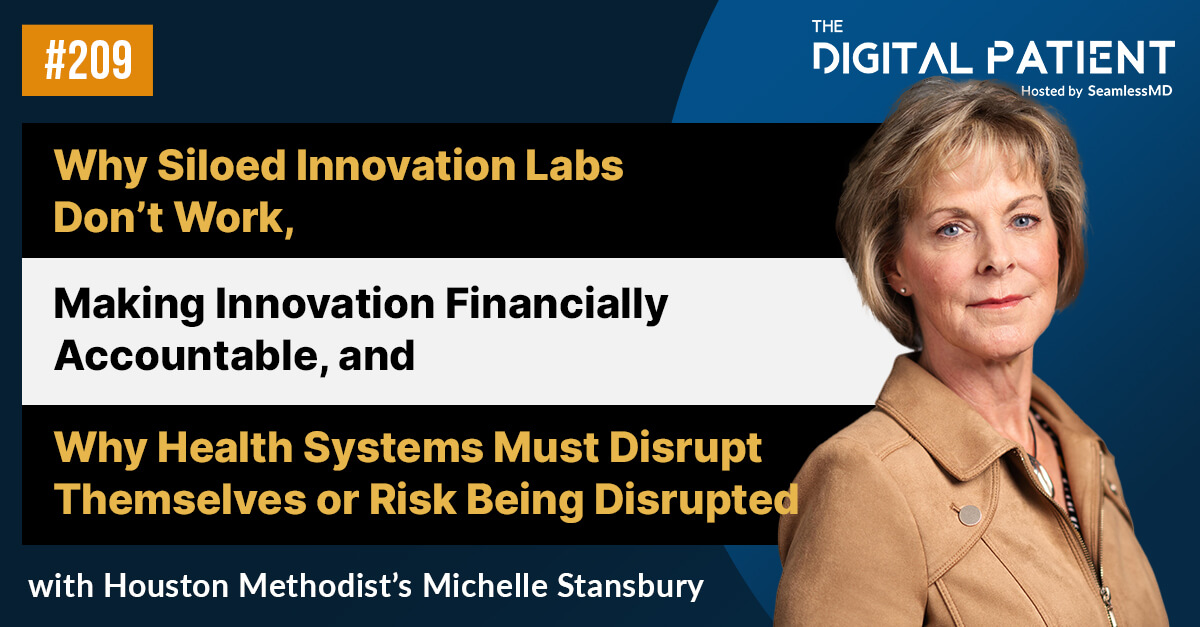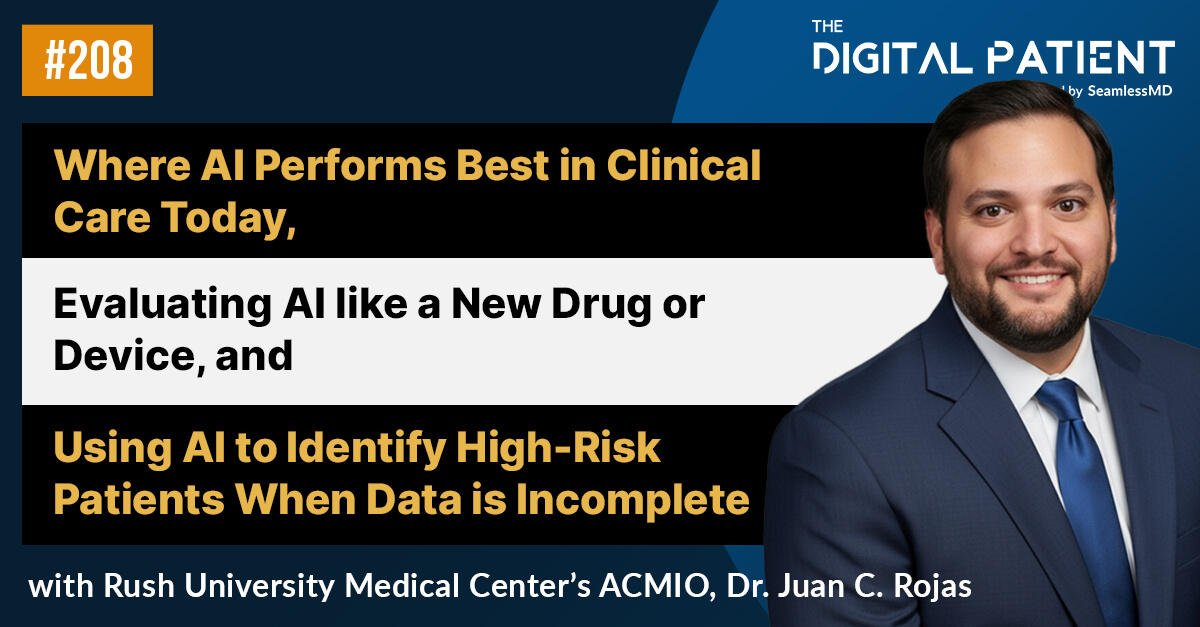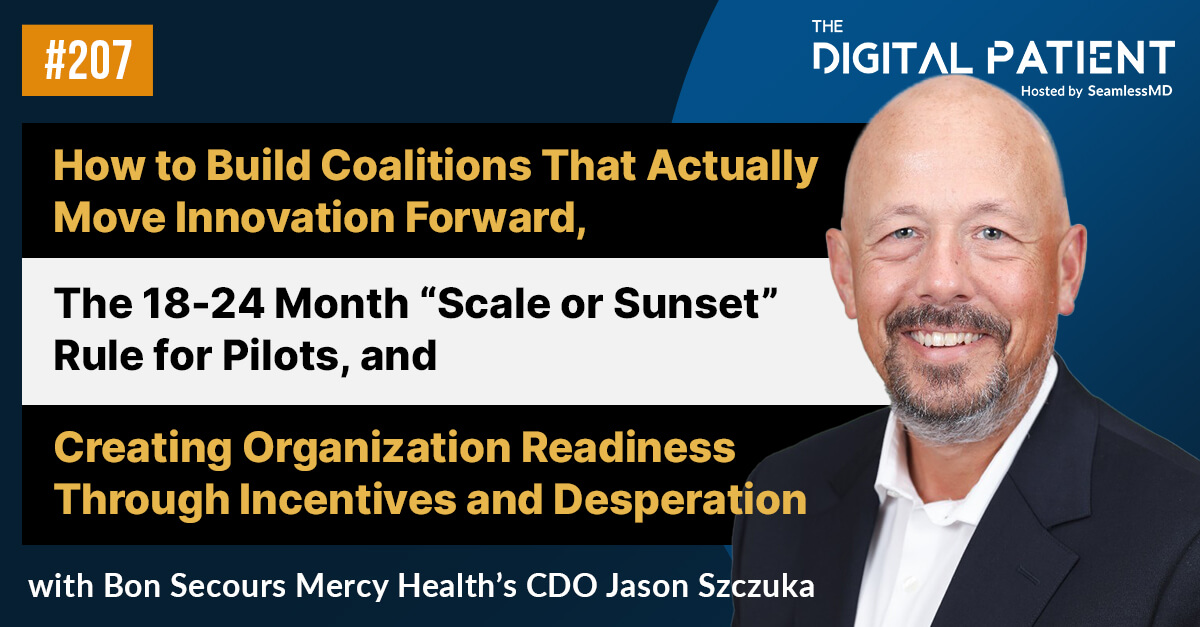Subscribe on: RSS | SPOTIFY | APPLE PODCAST | GOOGLE | BREAKER | ANCHOR
On this episode of "The Digital Patient" podcast, hosts Alan Sardana & Dr. Joshua Liu speak with Dr. Gregg Nicandri, Chief Medical Information Officer at the University of Rochester Medical Center, about "VR Training to Improve Surgical Quality, Eliminating the Mouse and Keyboard to Streamline Clinical Documentation, SDoH for Equitable Access to Care". Click the play button to listen or read the show notes below.
Audio:
Video:
Guest(s):
- Dr. Gregg Nicandri, Chief Medical Information Officer & Orthopedic Surgeon at the University of Rochester Medical Center
- Dr. Joshua Liu (@joshuapliu), Co-founder & CEO at SeamlessMD
Episode 83 - Show Notes:
[00:00] Introducing Dr. Gregg Nicandri, Chief Medical Information Officer & Orthopedic Surgeon at University of Rochester Medical Center;
[2:00] How a femur fracture at age 5, accompanied by an encouraging physician, led Dr. Nicandri to want to pursue orthopedics;
[5:15] How Dr. Nicandri first got involved with VR Simulation technology during his residency and why he believed VR training in addition to technical skill assessment (in particular the Arthroscopic Surgical Skill Evaluation Tool) could lead to better surgical quality and patient outcomes;
[10:15] Why Dr. Nicandri believes VR training is beneficial when combined with traditional curriculum as it can help train the steps of a procedure, how implants work, and can help a surgeon visualize before and after surgery;
[13:15] How Dr. Nicandri fell into the role of CMIO after being the orthopedic physician Epic builder and recognizing the broad impact he could have on physician satisfaction;
[16:36] How the role of the CMIO has evolved overtime, and how following COVID, Dr. Nicandri got more involved with strategy and supporting partnerships with tech innovators to leverage the health system’s massive repository of data & analytics to actually improve workflows and patient care;
[19:20] Why Dr. Nicandri believes eliminating processes is equally important to building new processes, and how reconfiguring the health system’s Clinical Decision Support and Best Practice Alerts have led to 2.4m clicks being eliminated;
[23:10] Why Dr. Nicandri advocates for eliminating processes, recognizing that changes are rarely permanent;
[24:30] Why Dr. Nicandri launched the Health Equity and Anti-Racism Technology (HEART) program, encouraged physicians to collect Social Determinants of Health information from patients to better visualize problems and connect patients with partner organizations such as the local 211 and other community organizations for transportation and food care management assistance;
[32:50] How Dr. Nicandri follows the ADKAR method of change management (Awareness, Desire, Knowledge, Ability, and Reinforcement), emphasizing listening to understand root problems, adapting language to build engagement from various stakeholders based on their problems, and reinforcing changes using measurable KPIs;
[41:15] Why Dr. Nicandri is excited about chatbots to understand patient search queries and eliminating the keyboard and mouse from the ambulatory clinic to bring empathy back into medicine, and why he is less excited by traditional RPM that requires staff to monitor patients and collect fragmented data;
Fast 5 / Lightning Round:
- What is your favorite book or book you’ve gifted the most?
“Leading with the Heart: Coach K's Successful Strategies for Basketball, Business, and Life” by Mike Krzyzewski
- Who is a person–dead or alive–you’d love to meet?
Question skipped.
- Would you rather have Super strength, super speed, or the ability to read people’s minds?
“Super speed”
- What is something in healthcare you believe that others might find insane?
“You can train and learn surgery without technical evaluation — biggest gap in surgical quality”
- COVID-19 lockdown related – what is 1 hobby or activity you’ve gotten into since the pandemic?
“Learned to play the acoustic guitar, following JustinGuitar on Youtube who makes incredible tutorials for beginners, intermediates, and advanced guitar players.”
.svg)










.png)
